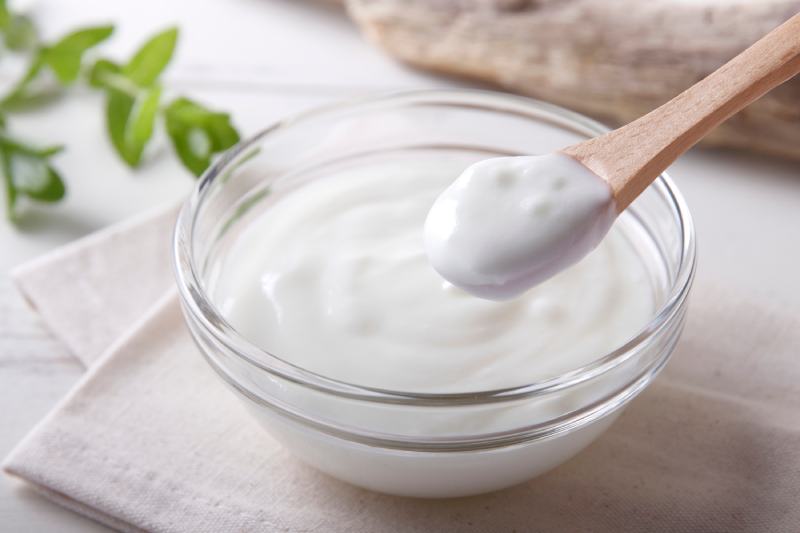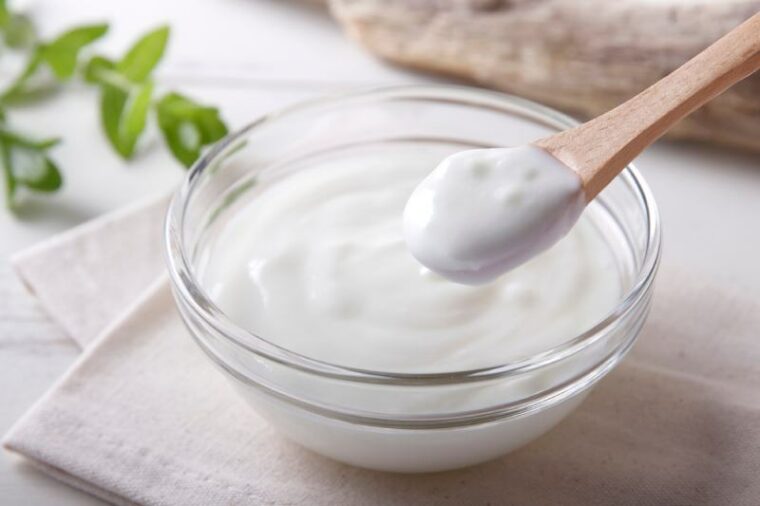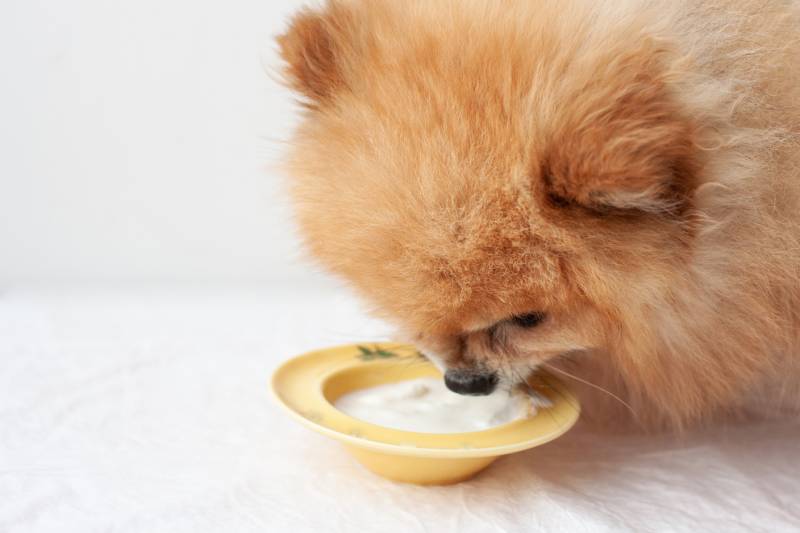- October 17, 2023
Can Dogs Eat Yogurt? Vet Approved Nutrition Facts & FAQ



The information is current and up-to-date in accordance with the latest veterinarian research.
Yogurt is one of the rare treats that blends a delicious flavor with potential health benefits. If you’re a diehard fan of the tasty dairy delight, you’ve probably wondered whether your pets could enjoy it as much as you do. As luck would have it, in moderation yogurt is generally a safe treat for dogs, and they love it!
Beyond their usual fare, yogurt shouldn’t be a staple of your dog’s diet despite its potential benefits. Learn how to make the healthiest choices for your pup as we explore whether dogs can eat yogurt.

Can Dogs Eat Yogurt?
Dogs can eat yogurt as a sparing treat and may derive some health benefits from it. Yogurt contains protein and rich amounts of calcium, promoting bone growth and muscle function. If you purchase yogurt with live active cultures, your dog can enjoy probiotic benefits. However, in the small amounts you should offer yogurt, they are unlikely to be in high enough amounts to make much of a difference to your dog’s gut microbiome.

Ordinary vs. Greek Yogurt
Greek yogurt switches up the nutritional benefits in a few ways. Since it strains out the whey that goes into standard yogurt, Greek yogurt has a sharper taste and a thicker, creamier texture. Calories increase slightly, and calcium decreases. But the amount of protein also goes up significantly while the sugar content falls. Although the sugar outweighs the protein in ordinary yogurt, Greek yogurt has nearly three times more protein than sugar. Ordinary and Greek yogurt can both supply probiotic cultures.
Regardless of the style you choose for your dog, a plain and low-fat variety is always the healthiest option. Extra sugars may cause an upset stomach and promote obesity in dogs. Sticking with unflavored options minimizes the downsides of eating yogurt.
What Are the Drawbacks of Feeding Yogurt to Dogs?
Ordinary sugar isn’t the only potential hazard to your dog’s health. Yogurts may contain artificial sweeteners, some of which can be toxic. Xylitol, a common sugar substitute, is particularly dangerous, presenting signs include hypoglycemia and acute liver failure.
Outside of sweeteners, dogs can also face trouble with the lactose content in yogurt. Since it’s a dairy product, yogurt contains a substantial amount of the milk sugar, which can cause GI upset, cramping, diarrhea, and vomiting in lactose-intolerant dogs. Greek yogurt contains less lactose than regular varieties, and probiotic yogurts help break down lactose, but any yogurt type can still be challenging for your dog to tolerate.


FAQ (Frequently Asked Questions)
Can Yogurt Impact a Dog’s Health?
Even the healthiest yogurt for dogs isn’t necessarily a practical addition to their diet. Despite the benefits of live active cultures and the high calcium content, the amount of yogurt you should offer your dog likely won’t significantly benefit their health.
A dog supplement is a more practical option if you want probiotics to make a meaningful difference in your dog’s diet. A pet-specific product is always a better choice since a dog’s gut microbiome is unique compared to a human’s. Though safe, yogurt and human probiotic supplements are less beneficial for them.
How Much Yogurt Can a Dog Eat?
Since it’s a treat, yogurt should take up no more than 10% of your dog’s daily diet. Depending on your dog’s size, you can provide around 1–3 tablespoons. Look for a probiotic-rich, low-fat or fat-free option with no sugar to reduce the chance of an upset stomach. Mix it into your dog’s food or offer it straight from the spoon. Alternatively, you can freeze small yogurt treats to help your dog cool off on a hot summer day.

Final Thoughts
If your dog develops a taste for your yogurt, you can feel confident about making it a regular feature among their daily treats. Monitor your dog for adverse reactions the first time they try yogurt to ensure they aren’t lactose intolerant or otherwise allergic. Although it shouldn’t play a substantial role in their diet, most dogs can appreciate the refreshing benefits of yogurt.
Featured Image Credit: NOBUHIRO ASADA, Shuttetstock
Tags
What do you think?
Related Articles

New Puppy Checklist: Gear You’ll Need for Your New Dog
Getting a new puppy is really exciting, but before you welcome them home, it’s important to prepare your space for them. Since puppies need a

How Big Do Mini Poodles Get? Vet Reviewed Average Weight & Growth Chart – Dogster
The information is current and up-to-date in accordance with the latest veterinarian research. Learn more » When you buy a Miniature Poodle, you might not

Can Police Dogs Smell Nicotine? Vet Verified Facts & Info – Dogster
The information is current and up-to-date in accordance with the latest veterinarian research. Learn more » While cigarette sales have been declining steadily for decades,

How Old Is 5 in Dog Years? Vet-Approved Guide to Each Size of Dog – Dogster
The information is current and up-to-date in accordance with the latest veterinarian research. Learn more » A common method for calculating a dog’s age is

